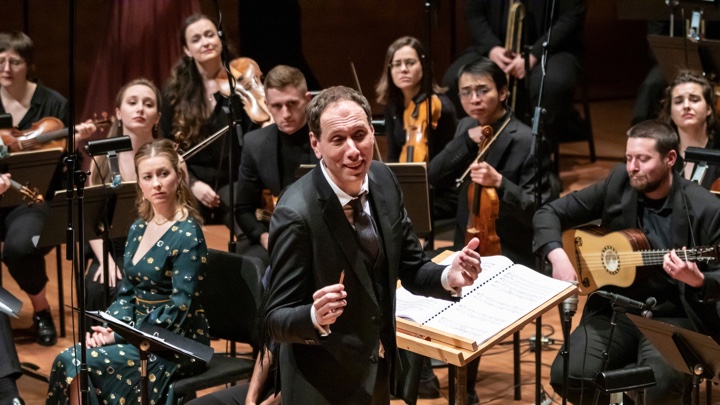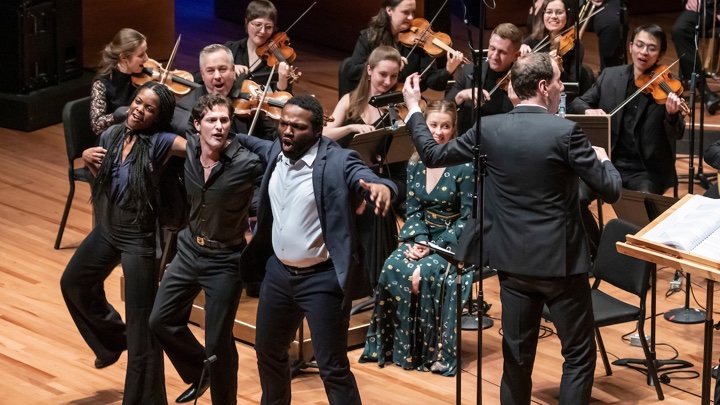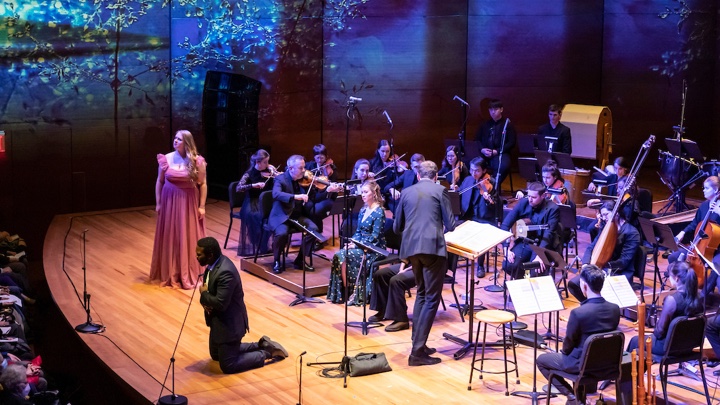
Both of his semi-operas The Fairy Queen and King Arthur were intended to be parts of extended spoken dramas. Through the years many staged versions of each have been tried, and usually for concert performances Purcell’s numbers alternate with a narration or dialogue delivered by actors.
On Saturday at Alice Tully Hall, Julliard 415, the school’s top-flight period-instrument ensemble, was joined by students from the Marcus Institute for Vocal Arts and Juilliard Drama for a rare semi-staging of King Arthur. Buoyantly led by guest conductor Lionel Meunier, Purcell’s delicious 90-minute score seduced us, but the unnecessarily complicated accompanying dialogue by recent Juilliard graduate Margot Connolly, newly commissioned for the occasion, bloated the evening to over two-and-a-half hours.
Earnestly delivered by Maggie Scrantom and Lark White as Emmeline and Traveler, Connolly’s awkward narrative dwelled on a bloody Arthurian conflict much at odds with Purcell’s wittily enchanting score.
Leader of the marvelous Belgian group Vox Luminus, Meunier conducted with what looked like a pen and occasionally joined in—piping on a sopranino recorder. He favored a less crisp, more legato approach to Purcell than one often hears and sometimes he struggled to keep his dozen vivacious singers and thirty instrumentalists together during the more spirited numbers. No libretto or projected titles were provided but the diction throughout was commendably clear.
Much of the vocal music is for chorus so there weren’t so many opportunities for soloists to stand out, but Erin O’Rourke revealed a lovely light soprano with a stylish feel for the late 17th century idiom. Her delightful interplay as Cupid with spirited baritone Shavon Lloyd as the Cold Genius made the third act a highpoint. He returned to duet beautifully with Jazmine Saunders in the ravishing fourth-act Passacaglia which Geun-hyeong Han led off with a too strait-laced “How happy the lover.”
Song Hee Lee’s gracefully ornamented “Fairest Isle” followed by Colin Aikins’s boisterous “Your hay it is Mow’d” should have capped off the evening on a blissful high. But whoever was in charge (no production coordinator/director was credited) made the boneheaded decision to have the dozen singers exit in pairs prompting rowdy applause during the concluding chaconne. One of the score’s most bewitching instrumental pieces was thereby ruined ending the show in needless disappointment.
As during previous King Arthur and The Fairy Queen concerts, I yearned to jettison the actors and revel in Purcell’s rich inventiveness. By coincidence on Saturday afternoon before the Juilliard performance, I listened to a broadcast on France Musique of another work that’s been bedeviled by unsuccessful attempts to solve its difficulties: Bernstein’s Candide.
The Lyon Opera production was conceived by American director Daniel Fish whose darkly imagined Oklahoma recently ran on Broadway. He discarded previous unwieldy libretti, and a narrator simply introduced each number with just a single aphorism. I’ve no idea how well this version worked on stage, but it struck me as an effective solution to the problem of Candide. Why not try less talk also for Purcell?
Returning to Juilliard 415 at Alice Tully over the weekend, I was reminded that I’d neglected to discuss two noteworthy singers I’d heard recently. Urgently needing to move beyond the local Iestyn Davies–Anthony Roth Costanzo monopoly, I searched out a quartet of concerts this fall featuring Reginald Mobley and Christopher Lowrey, two less fiercely promoted countertenors, performing baroque music by Purcell and others.
Juilliard 415 opened this season by inviting Mobley, its first-ever guest vocalist, to join with them and violinist-conductor Rachel Podger in a splendid program entitled “Orpheus Brittanicus.” I was eager to hear Mobley who performs regularly in Europe mostly in concert rather than in opera.
He’s one of a number of African-African countertenors currently attracting attention. They include John Holiday who made a striking if brief impression in The Hours at the Met and Key’mon Murray who will star next month in the title role in Handel’s Serse with the Detroit Opera and who was lately a plummy-sounding Sorceress in Dido at Munich’s Bavarian State Opera.
Mobley’s endearingly sweet voice excelled in Purcell’s “O Solitude” and especially in “Here the Deities Approve” from one of the composer’s lesser-known odes. A charming speaker, he introduced the works of Ignatius Sancho, a former slave who achieved some notoriety as a composer in London in the mid-18th century. Sancho’s pleasing songs may be slight but Mobley performed them with a winning sincerity.
In the concert’s second half, he turned to Handel for a mournfully spun “Cara sposa” from Rinaldo which make me wonder how he might succeed in the title character’s more fiery music. I’m usually unhappy when singers stray far for an encore—Simone Kermes performing Weill’s “Surabaya Johnny” after an all-Vivaldi concert still makes me shudder—but Mobley’s heartfelt rendition of “I’m so glad we had this time together” from the old Carol Burnett show accompanied by Du?an Balarin on the theorbo, swiftly disarmed any objections.His participation in pianist Simone Dinnerstein’s Bach series at Columbia University’s Miller Theater was a bit more uneven. Dinnerstein’s expansive realization of the continuo part in Widerstehe doch der Sñnde threatened to make the cantata’s vocal line subordinate to the piano’s.
She took on a less intrusive role in the well-known Ich habe genug leaving Mobley to partner superbly with oboist Peggy Pearson. I wonder if the concert’s modern tuning (rather than Juilliard 415’s lower baroque pitch) might have been responsible for some strain on Mobley’s upper register. In addition, his breathing could be disconcertingly audible.
Lowrey, who last season made his Metropolitan Opera debut as Guildenstern in Dean’s Hamlet, took part in the first local appearance of the San Francisco-based group Voices of Music, a concert sponsored by Gotham Early Music Scene, an organization whose biweekly email newsletter is an invaluable resource for anyone interested in pre-19th century music.
Throughout their concert of “Virtuosos Arias and Concertos” I was reminded of why I usually dislike concerts in church venues. Many feature muddy acoustics which often blur instrumental textures; several years ago, I walked out of a Juilliard 415 performance of Handel’s Alexander’s Feast because every choral detail was lost. In addition, the exceptionally hard, uncushioned pews of St. Ignatius of Antioch Church did a real number on my back during Lowrey and company.
His cool, sometimes hooty countertenor sounds very much in the English tradition, and one might even assume he is English. (An old friend of his seated behind me tartly gossiped to others that the American-born singer routinely affects an English accent!)
At first, Lowrey might seem at first a blandly amiable performer, but his readings of arias by Handel and Vivaldi were often startingly theatrical. Unlike Mobley, he regularly performs opera, and is a favorite at the Göttingen Handel Festival. He inventively decorated his da capo repeats with unexpected additions and wasn’t afraid to dip into his chest register for dramatic effect.
The intense “Gelido in ogni vena” from Vivaldi’s Farnace has clearly become a go-to aria: Lea Desandre included it in her recent Weill concert as well. Lowrey took the particular pleasure in fervent arias from Handel’s Flavio and Vivaldi’s Bajazet A different side of the countertenor was on display during “Sound the Trumpet,” an all-Purcell miscellany and part of TENET’s acclaimed annual series. It took place at St. Luke in the Fields whose clean, attractive acoustics and blessedly comfortable pews were a boon. From his harpsichord and organ Jeffrey Grossman suavely led the intermission-less concert featuring four fine singers and a small orchestral band that included two valveless trumpets played with impressive accuracy by Kris Kwapis and Thomas Muehlenbeck-Pfotenhauer.
TENET presented delectable selections from several Purcell welcome songs and odes as well as The Fairy Queen and King Arthur. If Jolle Greenleaf and Lowrey didn’t spar comfortably in the jaunty opening “Sound the trumpet” duet, they each soon found their best form with Lowrey eloquently repeating “Here the deities approve” which Mobley had also offered and Greenleaf wafting a lovely “Fairest Isle” toward her eagerly grateful audience. Bass Jonathon Adams, a singer previously unknown to me, impressed with bold agility and forthright declamation.
It’s been a long while since New York City was treated to so much Purcell, and I was very grateful.
Photos: © Rachel Papo





